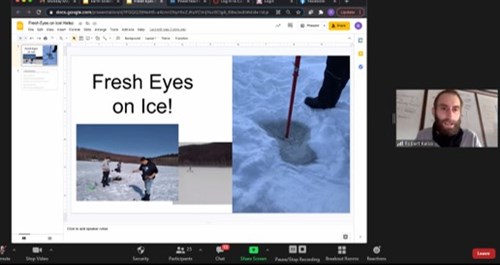4 May 2021

The ice season is winding down and we just had our seventh and final monthly community-based monitoring team (CBMT) workshop meeting. Starting in November with ice safety, freeze-up observing in December, all the way to an April ice data jam, and finishing up with really creative and diverse presentations from each community team (teachers, students, scientists, and other community ice aficionados). Here's a quick summary and Zoom screenshots from each community:
Tok told of wickedly unpredictable weather and mixing ice fishing with student ice observing.

Venetie got out often despite a cold winter and weird schedules.
Despite limited in-person class time, Bethel teachers have been out on the slough and are starting a very exciting ice safety poster contents with students and the help of local search and rescue.

Noatak's struggled with shortened classes and a trickling in of permission slips, but now classes are meeting longer which works well with getting students out on the ice. Plus their ice observing camera back online.

Students at Arctic Village got out often but took pictures of everything but ice and have hard-fought plans for an outdoor science fair. Geoff shared his Brooks Range ice misadventures as well.

Shageluk got creative with photos and videos of local ice dynamics on the Innoko River, but never found the infamous ice swan (snow-ice buoy) on Shageluk Lake. Lots of traditional knowledge shared about changing freeze-up, break-up and its impact on subsistence.

Fairbanks kids got out on Noyes Slough several times and made their own Fresh Eyes field notebooks. A final slough break-up pizza party is planned before school's out.

McGrath students, parents, and teachers practiced ice safety indoors first, then outdoors, and then got out lots to observe ice. Support from the town council will help access their main study site next year and provide a perfect set up for observing ice and staying warm.

Nenana and Anderson broke away from traditional monitoring on the Tanana (Nenana Ice Classic) and started a monitoring program on the local float pond. Student, pilot, and team-leader Aiden Coy explained the value of ice data to winter aviation in Alaska.

Thanks everyone for sharing your experiences from the winter of 2020-21. We'll be excited to observe through your eyes (and data) what happens next year!